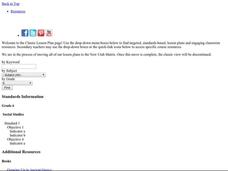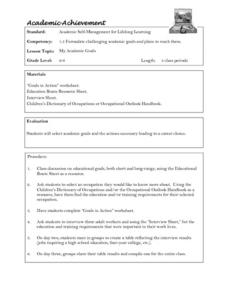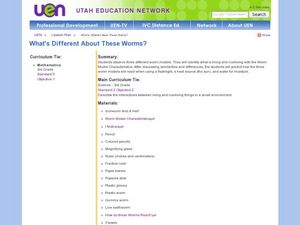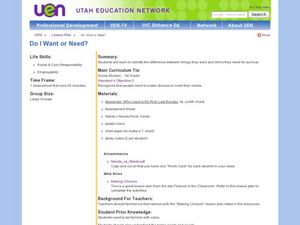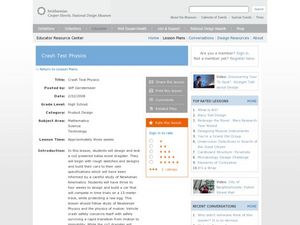Curated OER
Now You Have It, Now You Don't
Sixth graders compare corn-based shipping peanuts to Styrofoam shipping peanuts. In this hands-on environmental awareness lesson, 6th graders try dissolving two different types of packing peanuts in water.
Curated OER
Understanding MyPlate
Sixth graders recognize how using the food pyramid can add to their good health practices. In this food pyramid lesson, 6th graders build a 3-D food pyramid illustrating the desired amount of each food group.
Curated OER
Hand Washing: I can handle it!
Sixth graders examine microorganisms. In this germs instructional activity, 6th graders observe and record data on the positive and negative aspects of microorganisms. Students complete activities, view a film, and explore...
Curated OER
Ancient Mediterranean Lands: Greece
Sixth graders explore the processes developed by the Ancient Greeks, particularly olives and olive oil. In this Greek culture and inventions activity, 6th graders read an article and design a flap book. Students collect the olive...
Curated OER
From Foraging to Farming
Students experience the difficulty that goes along with foraging for food. In this lesson plan on the importance of modern agriculture, students simulate how there simply is not enough food and water for everyone when agricultural means...
Curated OER
Ancient Civilizations
Sixth graders complete map-work in order to understand the progression of hunter-gatherer societies. In this hunter-gatherer lesson plan, 6th graders label maps with the Equator, the Tropics, and the vegetation. They complete associated...
Curated OER
My Academic Goals
Students investigate academic goals and how they lead to career choices. They conduct interviews and complete worksheets, and discuss the issues.
Curated OER
A Bug's Life: Diary of an Insect's Metamorphosis
Fifth graders examine the stages of insect's to understand heredity. In this inherited traits lesson plan, 5th graders explore the life of the honeybee for its inherited traits. Students recognize the difference between inherited...
Curated OER
Creeping and Crawling Observing Mealworms and Earthworms
Young scholars observe the inherited traits in earthworms and mealworms. In this organisms lesson, students view a live mealworm and earthworm on a tray and identify the body parts. Young scholars measure the worms and observe the...
Curated OER
Book Cover Design
Students design book covers. For this graphic design lesson, students are introduced to designing book covers. Students develop skills on how to promote their designs to clients. Students then create their own book covers.
Curated OER
Me and My Job Shadow, Part 1
Third graders identify the skills that are important in performing helper jobs in the school and the skills that are possessed personally by them. They write a short paragraph to summarize the information taught about top three job...
Curated OER
Silly School vs. Super School
Students explore the importance of classroom jobs. They observe a puppet who is irresponsible and never gets her work completed and then discuss whether or not this puppet should be given a classroom job. As a class, they examine the...
Curated OER
Getting Ready for Success
Third graders review the poem and activity from the previous session and then work in groups of four to tape skill strips in the appropriate category on a Venn Diagram. Next, a spokesperson from each group gives a report summarizing...
Curated OER
Self Acceptance
Students explore their own self concept. They draw a picture of themselves, read a story, and write a story that has a character like themselves. Afterward, they write and illustrate their stories in PowerPoint.
Curated OER
High School Bag Design
Young scholars design a bag that they would personally use to carry needed items to school. For this bag design lesson, students observe real bags and assess needs and wants for a new bag. Young scholars brainstorm design solutions and...
Curated OER
Three Worm Lesson
Third graders observe properties of three worms. In this living and non-living lesson, 3rd graders study characteristics of living and non-living worms. Students experiment to find how light, heat and moisture effects each of the worms....
Curated OER
Do I Want or Need?
Students explore wants and needs. In this introductory economics instructional activity, students use a "pinch card" to display whether a familiar item is a "want" or a "need". Students listen to the book Alexander used to be Rich on...
Curated OER
Get Ready, Get Set, Get Organized! Lesson 2 of 2
Seventh graders examine the importance of being organized when making transitions. For this organization lesson, 7th graders watch a teacher demonstration of entering a room in a disorganized manner before discussing how the transition...
Curated OER
Crash Test Physics
Learners design and test balsa cars. In this crash tet instructional activity, students design and build their own cars to specifications. They explore the physics of motion and vehicle crash safety.
Curated OER
Cartoons for the Classroom: Herblock at 100
In this current events worksheet, students analyze political cartoons by Herb Block and respond to 3 talking point questions.
Curated OER
Cartoons for the Classroom: Dark Voice
In this current events worksheet, learners analyze a political cartoon by African-American Oliver Harrington and respond to 3 talking point questions.
Curated OER
Food Travels and Preservation
Fourth graders study food processing and distribution. In this food processing lesson, 4th graders investigate various methods of food preservation. Students study methods of food distribution.
Curated OER
Workers Who Help Us At School (Part 2)
First graders identify the roles and responsibilities of various school workers. They identify the skills that school workers need to complete their jobs. Students discuss what a role is. They discuss the term responsibility.
Curated OER
All Around the Neighborhood - Part 3
Second graders illustrate the roles, responsibilities, and skills of community members and write a paragraph that summarizes the importance of those roles, responsibilities, and skills. They are asked: "What is a role?" Students are...



